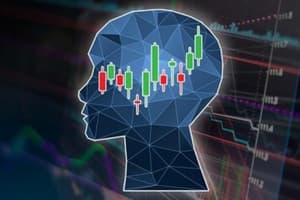Podcast
Questions and Answers
What is the 'disposition effect' in behavioral finance?
What is the 'disposition effect' in behavioral finance?
- Investors hold onto losing investments for too long and sell winning investments too early (correct)
- Investors rely solely on fundamental analysis to make investment decisions
- Investors diversify their portfolio to minimize risk
- Investors follow a contrarian strategy to buy low and sell high
What is herd behavior in financial markets?
What is herd behavior in financial markets?
- Investors follow the actions of the majority, leading to dramatic rallies and sell-offs (correct)
- Investors ignore market trends and act based on personal financial goals
- Investors always make rational decisions based on fundamental analysis
- Investors independently analyze market trends before making decisions
During herd behavior, why do investors tend to mimic the financial behaviors of others?
During herd behavior, why do investors tend to mimic the financial behaviors of others?
- To achieve balanced risk exposure
- To maximize their individual profit without external influence
- To create a diverse portfolio
- To respond to extreme emotions or emotional strains in the market (correct)
How does herd behavior manifest in financial markets during times like the COVID-19 pandemic?
How does herd behavior manifest in financial markets during times like the COVID-19 pandemic?
How do emotional factors like fear of loss impact decision-making in financial scenarios?
How do emotional factors like fear of loss impact decision-making in financial scenarios?
What does emotional finance focus on in behavioral finance?
What does emotional finance focus on in behavioral finance?
What concept does 'mental accounting' refer to in emotional finance?
What concept does 'mental accounting' refer to in emotional finance?
Under what conditions is decision-making under uncertainty relevant in finance?
Under what conditions is decision-making under uncertainty relevant in finance?
Which psychological factors can influence financial decisions according to behavioral finance?
Which psychological factors can influence financial decisions according to behavioral finance?
Which behavior is discussed within the context of behavioral finance as a result of investors not always being rational?
Which behavior is discussed within the context of behavioral finance as a result of investors not always being rational?
Flashcards
Behavioral Finance
Behavioral Finance
A subfield of finance that integrates psychology and economics to understand how emotions and cognitive biases affect financial decisions.
Emotional Finance
Emotional Finance
The impact of emotions like fear, anxiety, and excitement on financial decision-making. It introduces the idea that participants aren't always rational.
Mental Accounting
Mental Accounting
Allocating money for specific purposes, like treating a tax refund differently than a paycheck.
Decision-Making Under Uncertainty
Decision-Making Under Uncertainty
Signup and view all the flashcards
Disposition Effect
Disposition Effect
Signup and view all the flashcards
Herd Behavior
Herd Behavior
Signup and view all the flashcards
Social Contagion
Social Contagion
Signup and view all the flashcards
Study Notes
Behavioral Finance: Emotions and Decision-Making in Financial Markets
Behavioral finance is a subfield of finance that combines insights from psychology and economics to understand how emotional, social, and cognitive factors influence financial decision-making. This approach recognizes that investors are not always rational and self-controlled, but are subject to various biases and emotional influences. In this article, we will explore the subtopics of emotional finance, decision-making under uncertainty, and herd behavior within the context of behavioral finance.
Emotional Finance
Emotional finance is a branch of behavioral finance that focuses on how emotions and biases affect financial decision-making. It is based on the idea that financial participants are not perfectly rational and self-controlled, but rather psychologically influenced by factors such as fear, anxiety, and excitement. One of the key aspects of emotional finance is the concept of "mental accounting," which refers to the tendency to allocate money for specific purposes, such as spending tax refunds differently than paychecks, even though both types of funds can be considered income.
Decision-Making Under Uncertainty
Decision-making under uncertainty is a crucial aspect of behavioral finance, as it involves making choices in situations where the outcome is not known with certainty. Emotional factors, such as fear of the unknown and fear of loss, can lead to biases in decision-making, resulting in suboptimal financial outcomes. For example, the "disposition effect" in behavioral finance refers to the tendency of investors to hold onto losing investments for too long and sell winning investments too early, which can lead to missed opportunities and lower overall returns.
Herd Behavior
Herd behavior, also known as "social contagion," is a phenomenon in which people tend to mimic the financial behaviors of others, often in response to extreme emotions or emotional strains. This can lead to herding behavior in financial markets, where investors follow the majority's actions, resulting in dramatic rallies and sell-offs. An example of herd behavior can be seen in the market trends during the COVID-19 pandemic, where trendy investments like GameStop and cryptocurrency became popular among investors, regardless of their underlying value.
In conclusion, behavioral finance is a valuable framework for understanding how emotions, cognitive biases, and social influences shape financial decision-making. By recognizing and mitigating these influences, investors can make more rational decisions and achieve better financial outcomes.
Studying That Suits You
Use AI to generate personalized quizzes and flashcards to suit your learning preferences.




